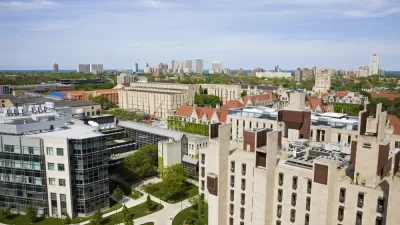For many years, economists have touted the higher-education and health care sectors as powerful engines for local economic growth. However, a growing chorus of observers are warning about the continued validity of that premise.
"The reasons many cities turn to eds and meds for economic development are easy to understand," observes Richard Florida. "Both industries have been defined by substantial growth over the past few decades, and that looks set to continue." However changes are afoot in those industries that will likely result in a "greater concentration of the education and medicine sectors in fewer cities and regions."
Florida and his colleagues dig into employment data to determine which local economies are most at risk by such consolidation. Their analysis reveals that small cities like Goldsboro and Greenville in North Carolina; Johnson City, Tennessee; and Rome, Georgia might want to diversify their economies.
And, as he notes, this might not necessarily be a bad thing. Analysis by his colleague Charlotta Mellander indicates that "[e]ds and meds employment levels were uniformly negatively associated with nearly every single important measure of regional economic performance: income, economic output per capita, and high tech industry concentration."
FULL STORY: Where 'Eds and Meds' Industries Could Become a Liability

Planetizen Federal Action Tracker
A weekly monitor of how Trump’s orders and actions are impacting planners and planning in America.

Chicago’s Ghost Rails
Just beneath the surface of the modern city lie the remnants of its expansive early 20th-century streetcar system.

San Antonio and Austin are Fusing Into one Massive Megaregion
The region spanning the two central Texas cities is growing fast, posing challenges for local infrastructure and water supplies.

Since Zion's Shuttles Went Electric “The Smog is Gone”
Visitors to Zion National Park can enjoy the canyon via the nation’s first fully electric park shuttle system.

Trump Distributing DOT Safety Funds at 1/10 Rate of Biden
Funds for Safe Streets and other transportation safety and equity programs are being held up by administrative reviews and conflicts with the Trump administration’s priorities.

German Cities Subsidize Taxis for Women Amid Wave of Violence
Free or low-cost taxi rides can help women navigate cities more safely, but critics say the programs don't address the root causes of violence against women.
Urban Design for Planners 1: Software Tools
This six-course series explores essential urban design concepts using open source software and equips planners with the tools they need to participate fully in the urban design process.
Planning for Universal Design
Learn the tools for implementing Universal Design in planning regulations.
planning NEXT
Appalachian Highlands Housing Partners
Mpact (founded as Rail~Volution)
City of Camden Redevelopment Agency
City of Astoria
City of Portland
City of Laramie





























